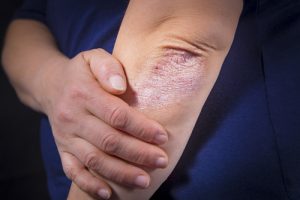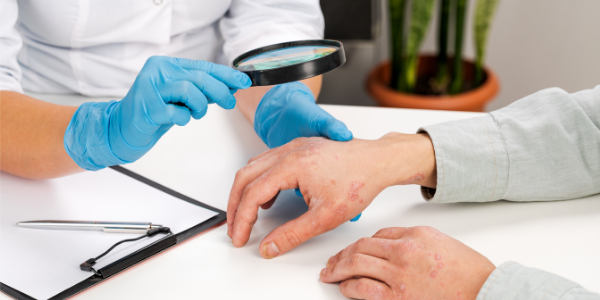Psoriasis is a chronic skin condition that typically first appears in the teen to young adult years. Psoriatic complications may increase as patients age.
Psoriasis Overview
The condition is an inflammatory autoimmune disease. There are a number of different types of it, but the most common one, plaque psoriasis, causes areas of thickened, itchy, red lesions called plaques. Silvery scales form on the plaques. These scales are the result of overactive, immature skin cells that make their way to the surface of the skin much faster than they should. These immature skin cells aren’t strong enough to protect the body as more mature skin cells would. This results in cracking, bleeding and deep, open cuts in the skin called fissures. As the immature cells pile up because they’re produced too fast, they form the typical silvery scaly appearance of plaque psoriasis.
Affecting two to three percent of the world’s population, the condition is relatively rare. It’s more common in women than in men.
Besides the plaque form, other types include the following:
- Pustular
- Palmar
- Guttate
- Erythrodermic
- Inverse
About one-third of people with the condition will eventually develop a form of arthritis called psoriatic arthritis or PsA, which occurs when the condition attacks the body’s joints, causing swelling, pain, redness, limited motion and permanent joint damage.
Psoriatic lesions can affect any part of the body with skin, including the scalp, soles and palms. PsA can attack any joint, but the knees, shoulders and hands are the most common targets. PsA typically does not affect joints on both sides of the body at the same time. Joint pain, swelling and redness appearing in both hands, both knees, both feet or elbows is more likely caused by rheumatoid arthritis, a condition with similar symptoms but not related to psoriasis.
Aging and Psoriasis
 The condition is chronic. It’s manageable but not curable. It’s often resistant to treatment, although new medications are more successful than older ones were. The cause is unknown, but there is a strong genetic factor. This means that if other people in your family have the disease, it’s more likely that you will, too. The condition can be disfiguring and create psychological and social problems. It’s not contagious.
The condition is chronic. It’s manageable but not curable. It’s often resistant to treatment, although new medications are more successful than older ones were. The cause is unknown, but there is a strong genetic factor. This means that if other people in your family have the disease, it’s more likely that you will, too. The condition can be disfiguring and create psychological and social problems. It’s not contagious.
Psoriatic disease is linked to aging because the longer the body is under inflammatory attack, the more likely that other conditions may appear. The condition was once thought to be strictly a skin disease with no serious medical complications. Scientists now know that this is not true. The inflammation present with psoriatic skin symptoms is actually system-wide and can affect all the body’s organs.
Chronic inflammation from psoriatic disease can set the stage for other serious diseases typically linked with aging, like diabetes and heart disease.
Managing the Condition as You Age
As you grow older, your risk for degenerative disease rises. Psoriatic disease is actually a risk factor for heart disease due to the systemic inflammation driving the disease on the cellular level. It’s important to have regular physical checkups and screenings for high blood pressure, blood triglyceride levels, prediabetes and diabetes among other conditions, such as osteoporosis. Osteoporosis is a weakening of the bones more common in women than men. As women move beyond menopause, declining estrogen levels no longer protect them against osteoporosis and increase the chances of heart disease.
Aging Skin
A common vitamin A-derivative ingredient called retinol may help treat fine lines and psoriatic patches at the same time. Widely available in skin creams, lotions, oils and serums, retinol helps improve the look of fine lines and wrinkles by boosting the skin’s collagen production and helping it retain more water. Retinol may also ease troubled psoriatic skin, especially limited areas of mild to moderate disease, by helping the skin to shed its extra surface cells. Results from retinol will vary. It’s best to consult with your physician before trying any new kind of treatment on your own.
Irritated psoriatic skin often responds to coconut and jojoba oils. These oils help soothe inflammation, dry patches and itching. Jojoba oil is especially good because its chemical composition is very close to that of the natural oils in the skin.
Conclusion
It’s odd to know that psoriasis itself isn’t much affected by age or the aging process. Once contracted, it’s a chronic disease requiring a lifetime of attention and treatment.





